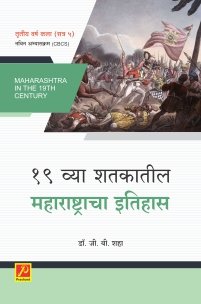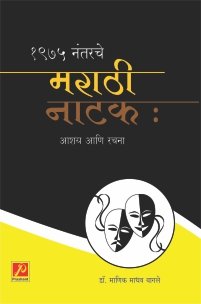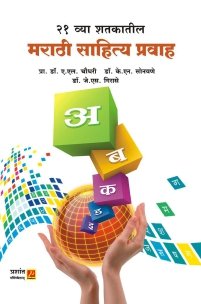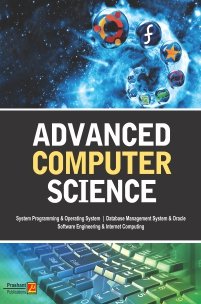-

‘घुमान’ मधील बाबा नामदेवजी
₹120.00घुमान आणि संत नामदेव यांचे पारस्परिक नाते असे विलक्षण आहे. नामदेवांच्यामुळेच घुमान वसले. काही एक विशिष्ट जीवनकार्य मनाशी निश्चित करुन चांगले वीस वर्षे नामदेव तिथे राहिले. तिथल्या जनसमुदायाशी समरस झाले. तिथली भाषा त्यांनी आत्मसात केली. त्या भाषेत पदरचना करुन आपली आध्यात्मिक अनुभूती त्यांनी शब्दांकित केली. समाजात नवे क्रांतिकारी विचार पेरले. तिथे त्यांना महंतपद प्राप्त झाले. त्यांचा शिष्यपरिवार वाढत गेला. त्यांचे मंदिर बनले. महाराष्ट्रात विठ्ठलाच्या भक्तीने वेडा होऊन नाचणारा एक भावुक भक्त दूरदेशी पंजाबात जाऊन ख्यातकीर्त महात्मा बनला. घुमान या सगळ्याचे साक्षी बनून राहिले.
– डॉ. निशिकांत मिरजकर
‘Ghuman’ Madhil Baba Namdevji
-

‘दासबोधा’तील मानवी मूल्ये
₹150.00मानवी जीवनाच्या साफल्यासाठीच ‘दासबोधा’ची रचना समर्थांनी केली. ‘दासबोधा’तील समर्थांनी सांगितलेली चतु:सूत्री म्हणजे सुखी, संपन्न, समर्थ व सफल जीवनाची गुरुकिल्लीच होय. समर्थकृत ‘दासबोध’ हा समर्थ संप्रदायाचा प्रमाण ग्रंथ मानला जातो. ‘दासबोधा’सारखा सार्वकालिक श्रेष्ठ ग्रंथ लिहून संत रामदासांनी स्वत:ची नाममुद्रा मराठी संतसाहित्यात उमटवली. सध्याच्या धावपळीच्या काळात मानवी नातेसंबंधात आलेला दुरावा, अत्याधिक भोगवादाकडे झुकलेले समाजमन, त्यागसमर्पणादि मूल्यांचा ऱ्हास, माणसांची पशुत्वाकडे होणारी वाटचाल या घटना पाहून सर्वंच बाबतीत भ्रमनिरास होत चालला आहे. अशा पार्श्वभूमीवर ‘दासबोध’ हा ग्रंथ एक पायवाट दाखवतो. या पायवाटेवरून चालल्यावर माणसे खऱ्या अर्थाने समाधानी होणार आहेत. यातली मानवी मूल्ये मानवाला सातत्याने तो मानव असल्याची जाणीव करून देणार आहेत.
Dasbodhatil Manvi Mulye
-

‘देव’ भेटलेला विद्यार्थी
₹75.00एक कविता अनुभवण्याजोगी
गोष्ट सांगतो तुझ्या हिताची, भल्या मुला तू ध्यानी धरीं,
प्रथम प्रयत्नीं यश नच आले, फिरुनि एकदा यत्न करी ॥धृ॥
धीर धरुनी यत्न करीतां, बळ तुजला येईल बरे
भिऊ नको तू मुळी कधीही, जिंकशील तू हेच खरे
एक-दोनदा अपयश आले, यत्न कराया कचरु नको
यत्नामध्ये लाज नसे यश जरि स्पर्धेमध्ये नसे,
अशा प्रसंगी वागू कसे?
यत्न करी तू यत्न लाडक्या फिरुनि एकदा यत्न करी,
प्रथम प्रयत्नी यश नच आले, फिरुनि एकदा यत्न करी ॥1॥
जरी तुज वाटे अवघड अपुले काम मुला तू यत्न करी
काळ तुला देईल तयाचे इमान खासे धीर धरी
जे जे सारे शक्ती सारे कार्य कराया इतरजन
ते ते तुजला शक्य का नसे धीराने करिता यत्न?
नियम मात्र हा ध्यानी धरी, फिरुनि एकदा यत्न करी
प्रथम प्रयत्नी यश नच आले फिरफिरुनी तू यत्न करी,
यत्न करी तू यत्न लाडक्या फिरुनि एकदा यत्न करी ॥2॥ -

‘देव’ माणसं अन् ‘गुणी’ लेकरं
₹125.00भाग : 2 – चंदाकाकांची वही
सहज संवाद…सर्वांच्या भल्यासाठी!सूर्यकांत अन् त्याची प्रेमळ, कष्टाळू, मेहनती ‘टोळी’…
अनेकोत्तम आशीर्वाद!
सूर्यकांत मला भेटला. खूप गप्पा झाल्या. आनंद वाटला. ‘टोळी’बद्दल त्याने जे जे सांगितलं ते ऐकून खूप समाधान वाटलं. असो.
बालगोपाळांसाठी तसेच छोट्या-मोठ्यांसाठी मी काही लिहून ठेवलेय. ते सारं मी तुम्हाला देतोय. ते तुम्ही सर्वांनी एकत्र बसून वाचावं. त्याचं मनन करावं वा त्यावर चर्चा करावी. जिथे मदत लागेल तिथे विनयसर आहेतच.
छोट्या दोस्तांनो, विनयसरांसारखी शिक्षकमंडळी अन् आईबाबा वा अनुभवी माणसं तुमच्या आसपास बोलायला, सांगायला, मार्गदर्शन करायला, शाबासकी द्यायला आहेत, ही किती मोठी व महत्त्वाची गोष्ट आहे.
असो. एकेक पान मन लावून, तेही मोठ्याने वाचा. वेळ मिळेल तेव्हा मला प्रत्यक्ष भेटा वा फोन करत माझ्याशी गप्पा मारा.
सर्वांना सर्व कामांसाठी शुभेच्छा, आशीर्वाद
तुमचा,
चंदाकाका
(टीप : काही गोष्टी मराठीत, हिंदीत आहेत तर काही इंग्रजीत. आणि हो, जे ‘खास पालकांसाठी’ म्हणून लिहिलेय ते त्यांना अवश्य वाचायला द्या. लेखच नव्हे तर पूर्ण पुस्तक त्यांना वाचू द्या. कळलं?)Dev Manas An Guni Lekar
-

‘मनाचे श्लोका’तील मानवी मूल्ये
₹150.00समर्थांचा उपदेश मानवी जीवन सुखकारक करण्यासाठी अत्यंत उपयुक्त आहे. ‘मनाचे श्लोक’ ही अजरामर कलाकृती आहे. पृथ्वीवर जोपर्यंत मानव आहे तोपर्यंत ‘मनाचे श्लोक’मधील उपदेशाची, नितीमूल्यांची अपरिहार्यता अबाधित राहील. ही नितीमूल्ये माणसाला सावरणारी, दिशा देणारी असल्याने मानवी जीवन उन्नत होण्याकामी ती अखिल जगाला दीपस्तंभासम आहेत. ‘मनाचे श्लोका’त असलेली – सुसंवादित्व, समाधान, सुविद्या, विश्वास, प्रयत्नवाद, निर्गर्वीता, अद्वैत, विरक्ती, मौन, देहातितता, क्रियाशीलता, कृतिउक्तीसाम्यता, लोभहीनता, दया, निष्कामता यांसारख्या मानवी मूल्यांची आत्यंतिक गरज आजच्या विकल वर्तमानात आहे. या मूल्यांचे आचरण समाजाने केले तर मानवी समूह सुखी होण्यास वेळ लागणार नाही. समर्थांना अभिप्रेत असणारा समर्थ संप्रदाय आकारास येण्यासाठी यातल्या मानवी मूल्यांचे दर्शन जागरूकतेने होणे हीच आजच्या काळाची नितांत गरज आहे.
Manache Sholkatil Manvi Mulye
-

10 Secret Steps Towards Success
₹499.00Ultimate Knowledge and Master Techniques to Achieve Success in Each and Every Aspect of Life.
– Raj Macwan, Life Coach.
Through this 10 Secret Steps, You will Learn –
- How to Eliminate Negative Thoughts Forever
- The Science of Creating Positive Thoughts in Your Mind
- How to Break out Bad Habits and Create the Habits Which Leads you towards Success
- How to Use Every Second of your Time Effectively
- The Secret Law – Which is governing the Whole Universe
- The Ultimate Science of Goal Setting and Achieving
- Master Technique: To Reprogram your Subconscious Mind
- The Science of Meditation, Types of Meditation and How to Meditate?
- The Seven Powerful Laws of Abundance
- How to Get Everlasting Success in Wealth, Health, Relationships, Career, Business, Studies and in Every Aspect of Life.
-

14 ऑक्टोबर 1956
₹250.00डॉ. विशाखा कांबळे यांनी दोन दशकांपासून मराठी साहित्य आणि प्राचीन पुरातत्त्व विषयात स्वतंत्रपणे लौकिकता प्राप्त केली. त्यांनी मराठी वाङ्मयातील सर्वच प्रकारांना लेखणीच्या माध्यमातून अतिशय सक्षम व समर्थपणे स्पर्श केलेला आहे. विशेष म्हणजे भारतातील सर्वाधिक उंचीचा वीरस्तंभाचा शोध लावून त्यावर संशोधन केले आहे. प्राचीन पुरातत्त्व व इतिहास विषयातही त्यांनी फार मोठे योगदान दिलेले आहे. संशोधन क्षेत्रात त्यांनी केलेले कार्य अतुलनीय आहे.
आजवर त्यांचे विविध प्रकारातील एकूण 21 ग्रंथ प्रकाशित झालेले आहेत. या सर्वच ग्रंथात मानवीमूल्य आणि जीवनमूल्यांवर त्यांनी अभ्यासपूर्ण विवेचन व चिंतन मांडलेले आहे. त्यांची संशोधनपर लेखन मिमांसा अभ्यासकांना विचारप्रवृत्त करण्यास भाग पाडते. मानववंश शास्त्राचे सर्व प्रमेय नव्या पद्धतीने मांडणार्या प्रतिभावंत संशोधक-लेखिका म्हणून साहित्य व पुरातत्त्व क्षेत्रात त्यांनी स्वतःची नाममुद्रा उमटविली आहे. त्यांना आंतरराष्ट्रीय, राष्ट्रीय व राज्यस्तरीय स्वरूपाचे एकूण 14 पुरस्कार प्राप्त झाले आहेत. वैशिष्ट्य म्हणजे त्यांचे आंतरराष्ट्रीय स्तरावरील 47 शोधनिबंध प्रकाशित झालेले आहेत.
त्यांनी चित्रपट, मालिका, नाटक, महानाट्यातून विविध भूमिकाही साकारल्या आहेत. डॉ. कांबळे अष्टपैलू व्यक्तिमत्त्वाच्या धनी आहेत.14 October 1956
-

19 व्या शतकातील महाराष्ट्र
₹225.001818 मध्ये बाजीराव पेशवा हा इंग्रजांना शरण गेला व छत्रपती शिवाजी महाराजांनी महत्प्रयासाने उभारलेले स्वराज्य संपुष्टात आले. त्याकाळी सामाजिक जीवनामध्ये जातीव्यवस्थेचे वर्चस्व वाढले होते. जातीव्यवस्था ही दृढ झाली होती. पेशवे काळामध्ये स्त्रीजीवन फारसे चांगले नव्हते. राजा राममोहन रॉय, म. फुले इ. सुधारकांनी केलेल्या प्रयत्नांमुळे समाजात सर्वांगीण सुधारणेस प्रारंभ झाला. समाजातील अनिष्ट प्रथांना मूठमाती दिली गेली. विविध वृत्तपत्रे, नियतकालिकांनी ज्ञान प्रसार आणि समकालीन घटनांना प्रसिद्धी देणे या दोन हेतूंनी समाजसुधारणेस हातभार लावला. ज्ञान आणि विज्ञानाचा परिचय सर्वसामान्यांना झाला. शिक्षणामुळे राजकीय, सामाजिक आणि आर्थिक विकास होतो, याची समाजाला जाणीव झाली. इंग्रजांनी विविध मार्गांनी भारतीयांचे शोषण केले. याबाबत दादाभाई नौरोजी यांनी आर्थिक निःसारणाचा सिद्धांत मांडला. त्यामुळे भारताच्या दारिद्य्राचे खरे कारण कळाले. न्यायमूर्ती रानडे, लोकमान्य टिळक, सुभाषचंद्र बोस, बाबासाहेब आंबेडकर, म. गांधीजींसारख्या नेत्यांनी याविरुद्ध आवाज उठविला व भारतीयांना स्वातंत्र्यप्राप्तीसाठी प्रेरणा दिली.
19 vya Shatakatil Maharashtracha Itihas
-

1975 नंतरचे मराठी नाटक : आशय आणि रचना
₹450.00नाटक ही समूहाने आस्वाद घेण्याची कला आहे. त्याच्या पाठ्याच्या आपल्याकडच्या जडणघडणीच्या प्रेरणा मात्र केवळ पाठ्याच्या एकेक एकेकट्याच्या आस्वादनाच्या असल्यामुळे आपल्याकडे सशक्त असे मंचित पाठ्य निर्माण होऊ शकले नाही. अशा प्रकारे नव्वदपूर्वीच्या मराठी नाटकामध्ये शब्द आणि प्रयोगामध्ये त्याचा उच्चार पर्यायाने वाचिक अभिनय महत्त्वाचा ठरला. सत्तरोत्तर रंगभूमीचे अवलोकन केले असता शब्दाचे महत्त्व कमी झालेले दिसून येते. पण त्याचे कारण या काळात सशक्त असे मंचित पाठ्य निर्माण झाले एवढेच फक्त नाही.
– प्रा. डॉ. प्रवीण भोळे,
विभाग प्रमुख, ललित कला केंद्र, सावित्रीबाई फुले पुणे विद्यापीठ, पुणे1975 Nantarche Marathi Natak : Ashaya Ani Rchana
-

1980 के बाद हिन्दी साहित्य
₹395.0021 वी सदी में ग्रामीण और आदिवासियों के संवैधानिक अधिकारों पर दृष्टिपात करते हुए आज की सदी में ग्रामीण और आदिवासियों का चिंतन आवश्यक है। स्वातंत्र्यपूर्व काल आज तक कई साहित्यकारों ने अपनी कलम चलाई है। विशेष रूप में उपन्यास सम्राट प्रेमचंद का समग्र साहित्य ग्राम जीवन के विविध अंगोंसे परिपूर्ण है। डॉ. रामदरश मिश्र और डॉ. विवेकी राय के ग्राम जीवन के सच्चे चितेरे है। 1980 बाद भी मिथिलेश्वर, मैत्रेयी पुष्पा, चित्रा ुदगल, मार्कण्डेय, लक्ष्मीनारायण लाल, गोविंद मिश्र, संजीव, केदारनाथ सिंह, महाश्वेतादेवी, फणेश्वरनाथ रेणु, कृष्णा सोबती, नागार्जुन, डॉ. शिवप्रसाद सिंह, राही मासूम रझा, विद्यासागर नौटियाल, मधुकर सिंह, शेखर जोशी, मोहनदास नैमिशराय, ओमप्रकाश वाल्मिकी, सरिता बडाइक, मलखान सिंह, अरूण कमल, लीलाधर जगूडी, लीलाधर मंडलोई आदि रचनाकारों ने अपनी रचनाओं में जीवंत ग्राम जीवन साकार किया है।
1980 के बाद भारतीय ग्राम जीवन में आये बदलावों और उकी चुनौतियों को अभिव्यक्त करनेवाले हिन्दी साहित्य का विचार-विमर्श करने का प्रयास किया गया है। ग्रामीण जीवन को लेकर जो अहं सवाल और समस्याएँ हमारे समक्ष खडे है, उन समस्याओं पर और सवालों पर हिन्दी साहित्यकारों ने किस हद तक लेखनी उठाई है उसे जानने का प्रयास भी किया गया है। इसके साथ-साथ ग्रामीण जनजीवन, कथावस्तु, पात्र, भाषा, प्रतिक, उद्देश्य, संस्कृति मेें भी जो बदलाव आये है उन्हें भी उजागर करने का प्रयास हुआ है।1980 Ke Bad Hindi Sahitya
-

20 व्या शतकातील महाराष्ट्राचा इतिहास
₹200.00विसावे शतक हे रौद्र शतक मानले जाते. या शतकात दोन महायुद्धे होवून मानव किती क्रूर होवू शकतो हे जगाला दिसले. जगात मोठ्या प्रमाणात मानवी आणि भौतिक संपत्तीची हानी झाली. हिंदुस्थानात गर्व्हनर जनरल लॉर्ड कर्झनने बंगालची फाळणी करून येथे राष्ट्रवाद निर्माण केला. लाल, बाल आणि पाल यांची त्यांतून निर्मिती होवून स्वराज्याची मागणी होवू लागली. त्यानंतर गांधीयुग उदयाला आले. स्वातंत्र्याची पहाट घेवून आले. पण त्यावर फाळणीचे धुके पसरले. भाषावार प्रांताची भारतात मागणी झाली. त्यातून नवीन प्रांतांची निर्मिती झाली. महाराष्ट्राचा दुर्दैवाने द्वैभाषिक राज्य गुजरातच्या जोडीने निर्माण झाले. गुजरात आणि महाराष्ट्र या दोन्ही राज्यांना हे द्वैभाषिक मान्य नव्हते. त्यातून मुंबई कोणाची ही समस्या निर्माण झाली आणि संयुक्त महाराष्ट्राची चळवळ सुरु झाली. 1960 मध्ये स्वतंत्र महाराष्ट्र राज्याची निर्मिती होवून या राज्याने मोठ्या प्रमाणात औद्योगिकरण साधले. त्यातून नागरीकरणाचा प्रश्न निर्माण झाला. सहकाराच्या मार्गाने या राज्याची प्रगति झाली. साखर, कापूस या उत्पादनांनी यश गाठले. याचा प्रारंभीचा पाया महाराष्ट्रातील अनेक विचारवंतांनी घातला. औद्योगिक प्रगतीमुळे कामगारांचे प्रश्न निर्माण झाले. ब्राह्मणेत्तर चळवळीबरोबर शेतकऱ्यांची चळवळ आणि दलित चळवळ ह्या चळवळी महाराष्ट्रात झाल्या. भारताला स्वातंत्र्य मिळाल्यानंतर हैद्राबादचा निजाम संघराज्यात सामील होत नव्हता. रझाकार चळवळीने त्याच्या राज्यात धुमाकूळ घातला. त्याला जमिनीवर आणण्याचे कार्य पोलिस कारवाईने केले. अशा अनेक घटनांचा आढावा या ग्रंथात घेण्याचा प्रयत्न केला आहे.
20 vya Shatakatil Maharashtracha Itihas
-

-

21 व्या शतकातील शिक्षण
₹425.0021 व्या शतकातील शिक्षण हे सर्जनशीलता, चिकित्सक विचार, सहयोग, सहकार्य आणि संप्रेषण/संवाद यावर भर देणारे असून माहिती संप्रेषण तंत्रज्ञानाच्या क्षेत्रात प्रचंड प्रगती झाल्यामुळे घरबसल्या विद्यार्थ्यांना खूप माहिती सहजगत्या उपलब्ध होते. विद्यार्थ्यांच्या सर्वांगीण विकास होण्यासाठी परिणामकारक अध्ययन करण्याची गरज आहे आणि यासाठी अनेक कार्यनीती शिक्षकांनी वापरल्या पाहिजेत. एखादा विशिष्ट किंवा क्लिष्ट, अवघड विषय विद्यार्थ्यांपर्यंत पोहोचविण्यासाठी शिक्षकाला विविध तंत्रे व कौशल्यांचे ज्ञान असावे. 21 व्या शतकातील कौशल्ये हि माहितीची देवाणघेवाण करण्यासाठी आणि योग्य मार्गाने वापरण्यावर अधिक भर देतात. शिक्षकाला सुविधादाता आणि अध्ययनासाठी प्रेरणा देणारा बनून विद्यार्थ्यांना कार्यतत्पर व सक्षम करावे. बदलत्या काळानुरुप शिक्षकाने आपली भूमिकाही बदलावी.
प्रस्तुत पुस्तकातील माहिती ही नेमका आशय, अचूक, सोप्या भाषेत, मुद्देसूदपणे मांडलेली असून तज्ज्ञ व्यक्तींचे ग्रंथ व लेखांचीही मदत घेतली आहे, जेणेकरून अद्ययावत ज्ञानाचा फायदा सर्वांना होईल.
21 Vya Shatkatil Shikshan
-

-

-

A Geographical Analysis of the Watershed
₹275.00His academic interests embrace various aspects of population, Agriculture and Biogeoraphy as well as environmental studies. He is a recognized Ph.D. Supervisor of Sant Gadge Baba Amravati University, Amravati. He has published numerous research papers and articles in journals and newspapers. He has been awarded “Paryavarn Puraskar”, by Sant Gadge Baba Amravati University, “Vasundhara Mitra Puraskar”, by Kirloskar Vasundhara Mitra Puraskar, Maharashtra and “Sarpa Sawardhan Puraskar”, by Maharashtra Sarpmitra Sanghatana, Maharashtra. He is currently nominated by Govt. of Maharashtra as” Honorary Wildlife Warden”, of Amravati Dist.
He is a life member of “Maharashtra Bhugol Shastra Parishad, Pune, Deccan Geographers Society, Pune. He is life member of Indian Science Congress as well as Executive Member of Amravati Chapter and life member of Society for Prevention of Cruelty to Animals of Amravati. He is Founder President of two NGOs “Center for Animal Rescue and Study”, and “People for Animals” Amravati. He is passionate sports person, participated in National and Inter University Softball, Baseball and Fencing competition. He loves adventure activities for Wildlife conservation and every year organised several awareness camp for wildlife conservation and environment education’s. -

-

-

-

-

-

-

-

-

-

-

-

-

-

-

Advanced Accountancy – IV
₹165.00We have great pleasure in presenting the text book on Advanced Accountancy for M.Com Semester IV students of KBC North Maharashtra University. The book has been written in student friendly approach, each chapter contains sufficient theory to acquire a through understanding of the concepts. This book delivers into the intricate world of audits, providing valuable insights and practical knowledge to auditors, professionals, and students alike. Through a series of lectures, we explore the audit procedures, regulations, and reporting requirements specific to different industries.
Unit 1 focuses on the audit of banks, encompassing the salient features of relevant enactments and the approach to bank audit. We examine the verification of assets and liabilities, including cash, investments, loans, and non-performing assets. Additionally, we delve into the audit of income and expenses, profit transfers, and dividends. In Unit 2, we shift our attention to th e audit of co-operative societies, analyzing the unique features and provisions outlined in the Maharashtra State Co-operative Societies Act. We explore the intricacies of auditing co-operative societies and discuss the essential components of an audit report for such entities. Unit 3 explores the audit procedures specific to specialized units such as hospitals, hotels, cinema halls, and hire-purchase and leasing companies. We delve into the distinct aspects of auditing each of these entities and highlight the key considerations and procedures to ensure effective audits. Unit 4 introduces the concept of Information System Auditing (IS Auditing) and emphasizes the need for auditing information systems. We cover the objectives, planning process, and evaluation of controls in an information system audit, including management controls, operational controls, organizational controls, and application controls. Unit 5 delves into the realm of management audit, providing an understanding of its nature, objectives, scope, and importance. We discuss the merits and limitations of management audit, drawing a clear distinction between management audit and statutory audit. Furthermore, we explore the qualifications, duties, and role of a management auditor, along with guidelines for drafting reports that enhance managerial effectiveness. Finally, in Unit 6, we unravel the intricacies of preparing audit reports for limited companies. We examine the contents and requirements of audit reports as mandated by the Companies Act, Companies (Audit and Auditors) Rules, and the CARO 2016. We also explore the nature of opinions expressed by auditors and the significance of notes to accounts about study of SA 700 and SA 800. -

-




